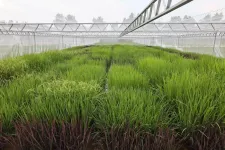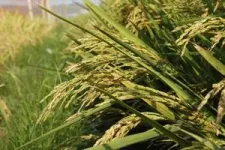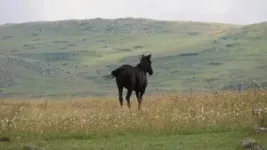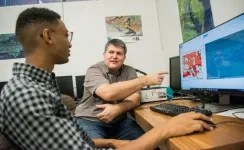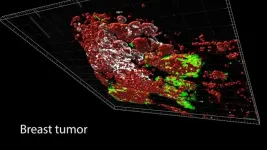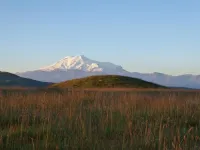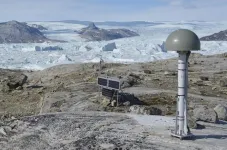(Press-News.org) Cold damage is a major challenge in rice production, and identifying key gene modules in signaling pathways is a crucial means of addressing this issue. A Chinese research team has recently discovered a part of the plant’s cell membrane that helps plants sense when it's cold.
This cell membrane component, known as the COLD6-OSM1 module, triggers the production of a special molecule, 2',3'-cAMP, which helps plants sense and respond to low temperatures. This secondary messenger is a key upstream component that mediates the signaling pathway by directly responding to signals from cold sensors. Previous studies have found that cold sensors predominantly trigger a calcium ion (Ca2+) signaling pathway that acts as a secondary messenger, but few other molecules functioning as secondary messengers had been identified.
IJaponica rice and indica rice are two subspecies that vary in chilling tolerance. In this study, Prof. CHONG Kang's team from the Institute of Botany of the Chinese Academy of Sciences used a genetic population derived from a cross between the chilling-tolerant japonica variety Kongyu131 and the chilling-sensitive indica variety Zhefu802 to identify a major QTL gene, COLD6 (CHILLING TOLERANCE DIVERGENCE 6), which negatively regulates cold tolerance in rice.
The team found a difference between japonica and indica rice in the number of CTC codons (encoding leucine) in the coding region of the COLD6 alleles. Specifically, japonica rice showed lower accumulation of the COLD6 protein from the plasma membrane under low-temperature conditions, thereby conferring stronger cold tolerance.
Further experiments indicated that COLD6 interacted with the cold-induced plasma membrane protein OSM1 to form a complex for sensing low temperatures. This interaction led to increased 2',3'-cAMP production, which complements calcium signaling to enhance cold tolerance in rice.
Since most modern “three-line” hybrid rice parents carry the tolerant COLD6 allele. editing the COLD6 gene may improve cold tolerance across various rice cultivars without negative effects on agronomic traits. These findings may be used to develop new strategies for breeding cold-resistant rice varieties.
Results of this study were published in Molecular Cell on Oct. 30.
END
Scientists uncover new mechanism in plant cold sensing
2024-10-30
ELSE PRESS RELEASES FROM THIS DATE:
Study shows natural regrowth of tropical forests has immense potential to address environmental concerns
2024-10-30
A new study in Nature finds that up to 215 million hectares of land (an area larger than Mexico) in humid tropical regions around the world has the potential to naturally regrow. That much forest could store 23.4 gigatons of carbon over 30 years and also have a significant impact on concerns like biodiversity loss and water quality. The study showed that more than half of the area with strong potential for regrowth was in five countries: Brazil, Mexico, Indonesia, China, and Colombia.
“Tree planting in degraded landscapes can be costly. By leveraging natural regeneration techniques, nations can meet their ...
After a heart attack, the heart signals to the brain to increase sleep to promote healing
2024-10-30
A heart attack can trigger a desire to get more sleep, allowing the heart to heal and reduce inflammation—and this happens because the heart sends special signals to the brain, according to a new Mount Sinai study. This research is the first to demonstrate how the heart and brain communicate with each other through the immune system to promote sleep and recovery after a major cardiovascular event.
The novel findings, published October 30 in Nature, emphasize the importance of increased sleep after a heart attack, and suggest that sufficient sleep should be a focus of post-heart-attack clinical management ...
Complexity of tumors revealed in 3D
2024-10-30
A new analysis led by researchers at Washington University School of Medicine in St. Louis has revealed detailed 3D maps of the internal structures of multiple tumor types. These cancer atlases reveal how different tumor cells — and the cells of a tumor’s surrounding environment — are organized, in 3D, and how that organization changes when a tumor spreads to other organs.
The detailed findings offer scientists valuable blueprints of tumors that could lead to new approaches to therapy and spark a new era in the field of cancer biology, according to the researchers.
The study is part of a group of 12 papers published Oct. 30 in the Nature suite of journals by members ...
Into the great wide open: How steppe pastoralist groups formed and transformed over time
2024-10-30
The wider Caucasus region, between the Black and the Caspian Seas, connects Europe, the Near East and Asia. It displays a huge geographic, ecological, economic, cultural, and linguistic range today, from the steppe zone in the north, the Caucasus mountains in the center, to the highlands of today’s Armenia, Georgia, Azerbaijan and Iran in the south. This diversity was no different in the past, where the archaeological record attests to many different influences from many surrounding regions.
“It is precisely this interface of different eco-geographic features ...
Determining precise timing of cellular growth to understand the origins of cancer
2024-10-30
Cancers are diseases of abnormal cellular growth, and although many are treatable or even curable, their origins are not necessarily clear. Understanding the precise timing of cellular events—as cells transition from normal to cancerous conditions—is key to uncovering new treatments or diagnostic opportunities.
Scientists from Vanderbilt University, led by Mirazul Islam, a graduate student mentored by Professor of Cell and Developmental Biology Ken Lau and Professor of Medicine Robert Coffey, have laid the groundwork for understanding and predicting the natural transition between precancers and cancer. They showed that colorectal cancer is likely to ...
Healthy brains suppress inappropriate immune responses
2024-10-30
The brain constantly engages in dialogue with the body’s immune system. Such communication appears aimed at ensuring a delicate balance between defending against injury and infection and guarding healthy tissue.
Now, scientists at Washington University School of Medicine in St. Louis have revealed how the two strike a healthy balance. The study, in mice, found that fragments of immune-stimulating proteins – dubbed guardian peptides – are produced by the brain and spinal cord of the central nervous system to maintain ...
Large meltwater accumulation revealed inside Greenland Ice Sheet
2024-10-30
A new study published in Nature unveils a surprising discovery: a substantial amount of meltwater is temporarily stored within the Greenland Ice Sheet during summer months. For the first time, an international group of researchers was able to quantify meltwater with positioning data. The finding challenges current models of how ice sheets contribute to global sea level rise.
The Greenland Ice Sheet is currently the largest single contributor to global sea-level rise, with the potential to raise the mean sea level by up to seven meters if it fully melts. While ...
Ancient DNA brings to life history of the iconic aurochs, whose tale is intertwined with climate change and human culture
2024-10-30
Geneticists from Trinity College Dublin, together with an international team of researchers, have deciphered the prehistory of aurochs – the animals that were the focus of some of the most iconic early human art – by analysing 38 genomes harvested from bones dating across 50 millennia and stretching from Siberia to Britain.
The aurochs roamed in Europe, Asia and Africa for hundreds of thousands of years. Adorned as paintings on many a cave wall, their domestication to create cattle gave us a harnessed source of muscle, meat and milk. Such ...
Reversing environmental decline: Lessons from African communities
2024-10-30
In rural Africa, where livelihoods are often tied directly to the land, environmental degradation poses a critical threat to both ecosystems and people’s well-being. New research reveals ways to tackle the dual challenges of land degradation and poverty.
In rural Africa, where livelihoods are often tied directly to the land, environmental degradation poses a critical threat to both ecosystems and people’s well-being. A new study co-authored by researchers at Stanford University and the French Agricultural Research Centre for International Development (CIRAD) analyzes how ...
'Black box' of stem cell transplants opened in world-first blood study
2024-10-30
For the first time, scientists have tracked what happens to stem cells decades after a transplant, lifting the lid on the procedure that has been a medical mystery for over 50 years.
Insights could pave the way for new strategies in donor selection and transplant success, potentially leading to safer, more effective transplants.
Researchers from the Wellcome Sanger Institute and their collaborators at the University of Zurich were able to map the behaviour of stem cells in recipients’ bodies up to three decades post-transplant, ...
